- Home
- Simon Beckett
Whispers of the Dead dh-3
Whispers of the Dead dh-3 Read online
Whispers of the Dead
( David Hunter - 3 )
Simon Beckett
A field of corpses, laid out in a macabre display… A serial killer who confounds even the most seasoned profilers… A doctor whose life has been shattered by crime—plunged into the heart of a shocking investigation… In this masterful new novel by Simon Beckett, #1 internationally bestselling author of Written in Bone and The Chemistry of Death, forensic anthropologist David Hunter is thrust into his first murder investigation on U.S. soil—and his most devastating case yet.
In the heat of a Tennessee summer, Dr. Hunter has come to Knoxville’s legendary “Body Farm”—the infamous field laboratory where law enforcement personnel study real corpses—to escape London and the violence that nearly destroyed his life. He’s also here to find out if he’s still up to the job of sorting through death in all its strange and terrible forms…. Hunter will soon find his answer when he’s called to a crime scene in a remote Smoky Mountain cabin—a scene as grisly as it is bizarre.
The body is taped to a table. Everything about the crime scene—the wounds, the decomposition, the microscopic evidence—quickly short-circuits the tools and methods of forensic experts. Within days, Hunter knows he’s dealing with a serial killer, someone intimately familiar with the intricacies of forensics. All around him, egos and hierarchies clash—from the boasts of a renowned criminal profiler to the dogged work of a young female investigator—but fate keeps pushing Hunter further into the heart of the manhunt. And the killer keeps coming up with surprises: booby-trapping corpses, faking times of death, swapping bodies—finally turning his sights on after Hunter himself….
An electrifying race against time, a fascinating journey into the world of forensic science, and a terrifying portrait of a killer in love with death itself, Whispers of the Dead is a thriller of the highest order.
Simon Beckett
WHISPERS OF THE DEAD
For my parents,
Sheila and Frank Beckett
ALSO BY SIMON BECKETT
The Chemistry of Death
Written in Bone
CHAPTER 1
SKIN.
The largest human organ, it is also the most overlooked. Accounting for an eighth of the entire body mass, on an average adult it covers an area of approximately two square metres. Structurally skin is a work of art, a nest of capillaries, glands and nerves that both regulates and protects. It is our sensory interface with the outside world, the barrier at which our individuality—our self—ends.
And even in death, something of that individuality remains.
When the body dies, the enzymes that life has held in check run amok. They devour cell walls, causing the liquid contents to escape. The fluid rises to the surface, gathering below the dermal layers and causing them to loosen. Skin and body, until now two integral parts of the whole, begin to separate. Blisters form. Whole swathes begin to slip, sloughing off the body like an unwanted coat on a summer’s day.
But, even dead and discarded, skin retains traces of its former self. Even now it can still have a story to tell, and secrets to keep.
Provided you know how to look.
* * *
Earl Bateman lay on his back, face turned to the sun. Overhead, birds wheeled in the blue Tennessee sky, cloudless but for the slowly dispersing vapour trail of a jet. Earl had always enjoyed the sun. Enjoyed the sting of it on his skin after a long day’s fishing, enjoyed the way its brightness lent a new look to whatever it touched. There was no shortage of sun in Tennessee, but Earl came originally from Chicago, and the cold winters there had left a permanent chill in his bones.
When he’d moved to Memphis back in the seventies, he’d found the swampy humidity far more to his liking than the windy streets of his home city. Of course, as a dentist in a small practice, with a young wife and two small children to keep, he didn’t spend as much time out in it as he might have liked. But it was there, all the same. He even liked the sweltering heat of Tennessean summers, when the breeze would feel like a hot flannel, and the evenings were spent in the airless swelter of the cramped apartment he and Kate shared with the boys.
Things had changed, since then. The dental practice had flourished, and the apartment had long since given way to bigger and better things. Two years before, he and Kate had moved into a new five-bedroomed house in a good neighbourhood, with a wide, rich green lawn where the growing brood of grandchildren could safely play, and the early morning sunshine would shatter into miniature rainbows in the fine spray from the water-sprinkler.
It had been on the lawn, sweating and cursing as he’d struggled to saw off a dead branch from the big old laburnum, that he’d had the heart attack. He’d left the saw still trapped in the tree limb and managed to take a few faltering steps towards the house before the pain had felled him.
In the ambulance, with an oxygen mask strapped over his face, he had held tightly on to Kate’s hand and tried to smile to reassure her. At the hospital there had been the usual urgent ballet of medical staff, the frantic unsheathing of needles and beeping of machines. It had been a relief when they’d eventually fallen silent. A short time later, after the necessary forms had been signed, the inevitable bureaucracy that accompanies each of us from birth, Earl had been released.
Now he was stretched out in the spring sun. He was naked, lying on a low wooden frame that was raised off the carpet of meadow grass and leaves. He’d been here for over a week, long enough for the flesh to have melted away, exposing bone and cartilage under the mummified skin. Wisps of hair still clung to the back of his skull, from which empty eye sockets gazed at the cerulean blue sky.
I finished taking measurements and stepped out of the wire mesh cage that protected the dentist’s body from birds and rodents. I wiped the sweat from my forehead. It was late afternoon and hot, despite the early season. Spring was taking its time this year, the buds swollen and heavy. In a week or two’s time the display would be spectacular, but for now the birch and maples of the Tennessee woodland still hugged their new growth to them, as though reluctant to let go.
The hillside I was on was unremarkable enough. Scenic almost, though less dramatic than the imposing ridges of the Smoky Mountains that rose up in the distance. But it was an altogether different aspect of nature that struck everyone who visited here. Human bodies, in various stages of decay, lay all around. In the undergrowth, out in the full sun and lying in the shade; the more recent still bloated with decompositional gases, the older ones desiccated to leather. Some were hidden from view, buried underground or in car boots. Others, like the one I’d been weighing, were covered by mesh or chain-link screens, laid out like exhibits in some grisly art installation. Except that the purpose of this place was far more serious. And far less public.
I put my equipment and notepad back into my bag, flexing my hand to work the stiffness from it. A thin white line ran across my palm where the flesh had been laid open to the bone, cleanly bisecting the lifeline. Appropriately enough, given how the knife that had almost ended my life the previous year had also changed it.
I lifted the bag on to my shoulder and straightened. There was only the faintest of twinges from my stomach as I took the weight. The scar underneath my ribs was fully healed, and in another few weeks I’d be able to stop taking the antibiotics I’d been on constantly for the past nine months. I’d remain prone to infection for the rest of my life, but I counted myself lucky only to have lost a section of intestine along with my spleen.
It was what else I’d lost that I was finding harder to come to terms with.
Leaving the dentist to his slow decay, I skirted a body that lay partially hidden by shrubs, this one darkened and swollen, and followed the nar
row dirt trail that meandered down through the trees. A young black woman in grey surgical smock and trousers was crouching by a half-hidden cadaver that was resting in the shade of a fallen tree trunk. She was using tweezers to pick squirming larvae from it, dropping each one into a separate screw-top jar.
‘Hi, Alana,’ I said.
She looked up and gave me a smile, tweezers poised. ‘Hey, David.’
‘Is Tom around?’
‘Last I saw him he was down by the pads. And watch where you step,’ she called after me. ‘There’s a district attorney in the grass down there.’
I raised my hand in acknowledgement as I carried on down the trail. It ran parallel to a high, chain-link fence that surrounded the two acres of woodland. The chain-link was topped with razor wire and screened by a second fence, this one made from timber. A large gate was the only way in or out, on which was hung a painted sign. In plain black letters were the words Anthropology Research Facility, but it was better known by another, less formal name.
Most people just called it the Body Farm.
The week before, I’d stood in the tiled hallway of my London flat, packed bags at my feet. A sweet chorus of birdsong sounded from the pale spring dawn outside. I ran through my mental list of things I needed to check, knowing I’d done everything already. Windows locked, post put on hold, boiler switched off. I felt edgy and ill at ease. I was no stranger to travelling, but this was different.
This trip there wouldn’t be anyone waiting for me when I came back.
The taxi was late, but I had plenty of time to catch my flight. Still I found myself restlessly checking my watch. A few feet from where I stood, the black and white Victorian floor tiles caught my eye. I looked away, but not before the Harlequin pattern prompted the usual connection in my memory. The blood had long since been washed off the area next to the front door, just as it had from the wall above it. The entire hallway had been painted while I’d still been in hospital. There was no physical reminder of what had taken place here the previous year.
But all at once I felt claustrophobic. I carried my bags outside, careful not to put too much strain on my stomach. The taxi pulled up as I closed the front door. It shut behind me with a solid thunk that had a sound of finality about it. I turned away without a backward glance and walked to where the taxi was chugging out its fug of diesel fumes.
I took the cab only as far as the nearest tube station and caught the Piccadilly line to Heathrow. It was too early for the morning rush, but there were still people in the carriage, avoiding looking at each other with the instinctive indifference of the Londoner.
I’d be glad to leave, I thought, fervently. This was the second time in my life I’d felt the need to get away from London. Unlike the first, when I’d fled with my life in tatters after the death of my wife and daughter, I knew I’d be coming back. But I needed to escape for a while, to put some distance between myself and recent events. Besides which, I’d not worked in months. I hoped this trip would be a way of easing me back into things again.
And of finding out if I was still up to the job.
There was no better place to find out. Until recently, the facility in Tennessee had been unique, the only outdoor field laboratory in the world where forensic anthropologists used real human cadavers to study decomposition, recording the essential clues that might point to when and how death had occurred. A similar facility had now been set up in North Carolina, and also in Texas, once local concerns about vultures had been overcome. I’d even heard talk about one in India.
But it didn’t matter how many there might be: in most people’s minds the research facility in Tennessee was still the Body Farm. It was in Knoxville, part of the University of Tennessee’s Forensic Anthropology Center, and I’d been lucky enough to train there early in my career. But it had been years since my last visit. Too long, as Tom Lieberman, its director and my old teacher, had told me.
As I sat in the departure lounge at Heathrow, watching the slow and silent dance of aircraft through the plate glass window, I wondered what it would be like going back. During the months of painful recovery after I came out of hospital—and the even more painful aftermath—the promise of the month-long trip had been something to work towards, a badly needed fresh start.
Now I was actually on my way, for the first time I wondered if I hadn’t invested too much hope in it.
There was a two-hour stopover in Chicago before I caught my connecting flight, and the tail end of a storm was still grumbling as the plane landed in Knoxville. But it quickly cleared, and by the time I’d collected my baggage the sun was starting to break through. I breathed deeply as I left the airport terminal to collect my hire car, enjoying the unfamiliar humidity in the air. The roads steamed, giving off the peppery tang of wet tarmac. Against the slowly receding blue-black of the thunderheads, the rainfall gave the greens of the lush countryside around the highway an almost dazzling vibrancy.
I’d felt my spirits lift as I neared the city. This is going to work.
Now, barely a week later, I was no longer so sure. I followed the trail as it skirted a clearing in which stood a tall wooden tripod that resembled a bare tepee frame. A body lay on a platform beneath it, waiting to be hoisted and weighed. Leaving the trail—and remembering Alana’s warning—I crossed the clearing to where several rectangular pads of concrete were set into the soil, starkly geometric in the woodland setting. Human remains were entombed in them, part of an experiment to see how effective ground-penetrating radar was in body location.
A tall, gangly figure in chinos and a floppy bush hat knelt a few yards away, scowling as he examined a gauge on a length of pipe protruding from the ground.
‘How’s it going?’ I asked.
He didn’t look up, peering through his wire-framed glasses as he gently nudged the gauge with a finger. ‘You’d think it’d be easy to catch a smell this strong, wouldn’t you?’ he said by way of answer.
The flattened vowels betrayed his East Coast roots rather than the curling southern drawl of Tennessee. For as long as I’d known him, Tom Lieberman had been searching for his own Holy Grail, analysing the gases produced by decomposition molecule by molecule to identify the odour of decay. Anyone who’d ever had a mouse die under their floorboards could testify it existed, and it continued to exist long after human senses failed to detect it. Dogs could be trained to sniff out a cadaver years after it had been buried. Tom theorized that it should be possible to develop a sensor that would do much the same thing, making body location and recovery immeasurably easier. But, as with anything else, theory and practice were two very different things.
With a grunt that could have been either frustration or satisfaction he stood up. ‘OK, I’m done,’ he said, wincing as his knee joints cracked.
‘I’m heading over to the cafeteria for some lunch. Are you coming?’
He gave a wistful smile as he packed away his equipment. ‘Not today. Mary’s packed sandwiches. Chicken and beansprouts, or something else disgustingly healthy. And before I forget, you’re invited over for dinner this weekend. She seems to have got it into her head that you need a proper meal.’ He pulled a face. ‘You she wants to feed up; me, I just get rabbit food. Where’s the justice in that?’
I smiled. Tom’s wife was a great cook, and he knew it. ‘Tell her I’d love to come. Do you want a hand with your gear?’ I offered, as he hoisted his canvas bag on to his shoulder.
‘No, it’s OK.’
I knew he didn’t want me to exert myself. But even though we walked slowly back to the gate I could see that the effort left him breathless. When I’d first met Tom he’d already been well into his fifties, happy to give encouragement to a fledgling British forensic anthropologist. That was longer ago than I cared to remember, and the intervening years had left their mark. We expect people to remain as we remember them, but of course they never do. Still, I’d been shocked at how changed Tom was when I saw him again.
He hadn’t formally announced when he was
stepping down as director of the Forensic Anthropology Center, but everyone knew it was likely to be before the end of the year. The local newspaper had run a feature on him two weeks earlier that had read more like a testimonial than an interview. He still looked like the basketball player he’d once been, but encroaching age had lent a gauntness to his already lean frame. There was a hollowness to his cheeks that, with the receding hairline, gave him an air that was both ascetic and worryingly frail.
But the twinkle in his eyes remained unchanged, as did his humour and a faith in human nature that was undimmed despite a career spent trawling through its darker side. And you’re not exactly unscathed yourself, I reflected, remembering the ugly striation of flesh under my shirt.
Tom’s station wagon was in the car park adjacent to the facility. We paused at the gate, pulling off the protective gloves and overshoes we’d been wearing before going out. With the barrier pulled shut behind us, there was nothing to suggest what lay on the other side. The trees behind the fence looked mundane and innocuous as they rustled in the warm breeze, bare branches shading green with new life.
Once we were in the car park I took my mobile from my pocket and switched it back on. Although there were no rules against it, I felt uncomfortable disturbing the peace and quiet inside the facility with phone calls. Not that I was expecting any. The people who might have contacted me knew I was out of the country, and the person I most wanted to talk to wouldn’t be calling.
I put the phone away as Tom opened the boot and slid his bag into the back. He pretended not to be breathing heavily, while I pretended not to notice.
‘Give you a lift to the cafeteria?’ he offered.
‘No thanks, I’ll walk. I need the exercise.’
‘Admirable discipline. You put me to shame.’ He broke off as his phone rang. He took it out and glanced at the display. ‘Sorry, got to take this.’

 Where There's Smoke
Where There's Smoke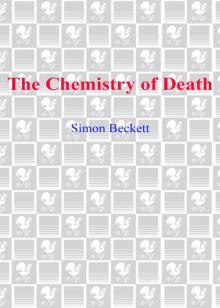 The Chemistry of Death
The Chemistry of Death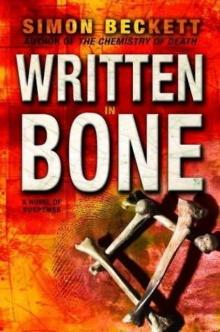 Written in Bone
Written in Bone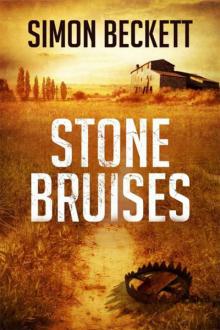 Stone Bruises
Stone Bruises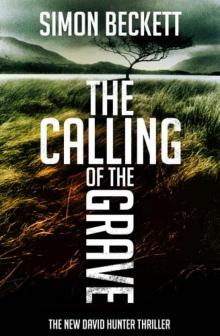 The Calling of the Grave
The Calling of the Grave Whispers of the Dead
Whispers of the Dead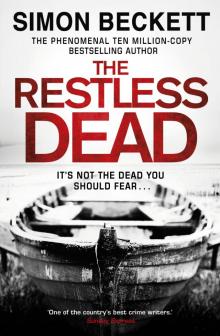 The Restless Dead
The Restless Dead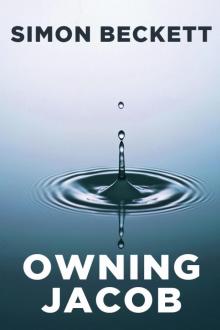 Owning Jacob
Owning Jacob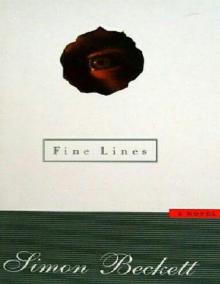 Fine Lines
Fine Lines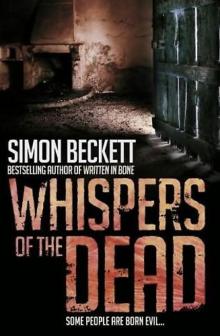 Whispers of the Dead dh-3
Whispers of the Dead dh-3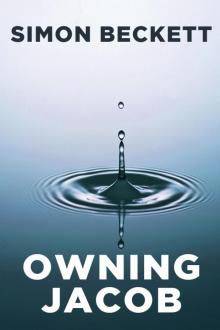 Owning Jacob (1998)
Owning Jacob (1998)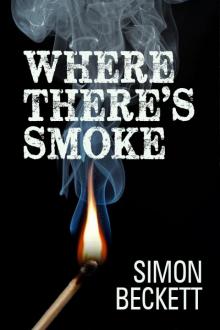 Where There's Smoke (1997)
Where There's Smoke (1997)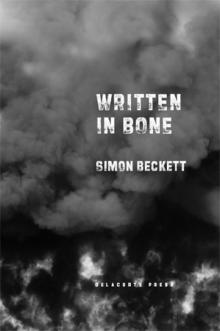 Written in Bone dh-2
Written in Bone dh-2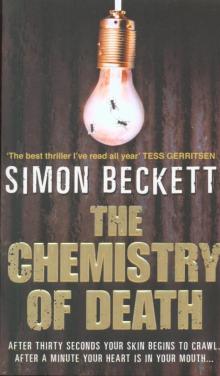 The Chemistry of Death dh-1
The Chemistry of Death dh-1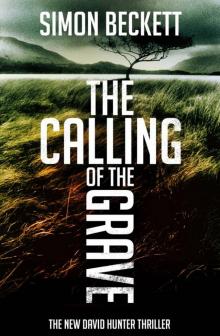 The Calling Of The Grave dh-4
The Calling Of The Grave dh-4